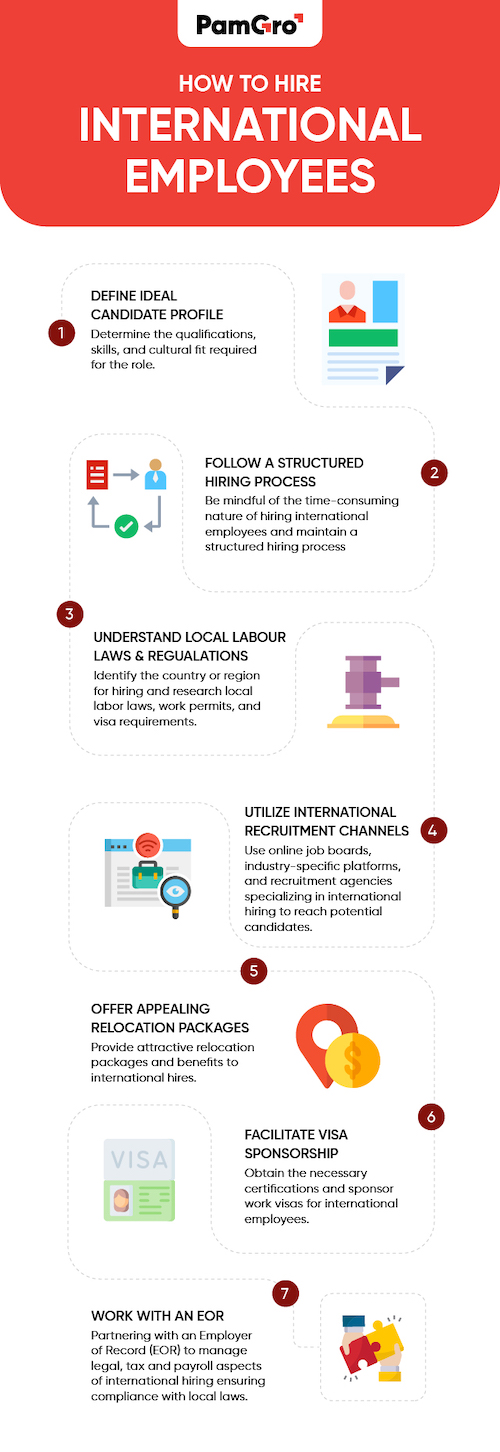TABLE OF CONTENTS
- Benefits of Hiring Internationally
- Options for Hiring Foreign Workers
- How to Hire International Employees?
- Challenges for Employers Hiring Internationally
- Risks in Hiring International Workers
- What are the Visa Regulations around hiring Overseas Employees?
- How PamGro makes International Hiring Easy?
Technological advances in the last decade have made international hiring more feasible and appealing for many businesses. Hiring international employees can bring numerous advantages, such as access to a broader talent pool, increased diversity, and the ability to cover different time zones. However, expanding beyond domestic borders also presents unique challenges related to compliance, payroll, benefits, and visas.
This comprehensive guide discusses the benefits and potential drawbacks of international hiring, various options for hiring employees abroad, and how to navigate visa regulations. Additionally, we will introduce PamGro, a global payroll solution that can help simplify hiring and managing international employees.
Benefits of Hiring Internationally
1. Access to Broader Talent Pool
According to a report by Deloitte, “the global talent shortage is worsening, with 87% of CEOs very concerned about the availability of key skills” (Deloitte, 2019).
By tapping into international markets, businesses can access a more extensive range of talented individuals with specialised skills that may not be readily available domestically.
2. Increased Diversity
Research conducted by McKinsey & Company revealed that ethnically diverse companies were 33% more likely to outperform their competitors (McKinsey & Company, 2015). Furthermore, gender-diverse organizations were 15% more likely to achieve above-average financial returns. Hiring international employees can increase workplace diversity, further job opportunities, foster innovative thinking, and improve decision-making.
3. Ability to Cover Different Time Zones
Expanding into various time zones enables businesses to provide continuous customer support, accelerate product development cycles, and increase overall operational efficiency.
According to a study by Indeed, teams collaborating across different time zones reported higher satisfaction and productivity than colocated teams (Indeed, 2018).
Options for Hiring Foreign Workers
1. Set up a legal entity in the country
Establishing a legal entity in the target country involves registering a local business, obtaining necessary licenses and permits, and adhering to local labor laws. Although this method grants businesses complete control over operations, navigating regulatory nuances in foreign countries can be time-consuming, expensive, and challenging.
Below is a good checklist of everything you need to have a dedicated office in a foreign country:
- Business registration
- Domain name registration
- Accountant fees
- Legal fees
- Professional registrations and fees
- Licenses and permits
- Consultant fees
In hiring discussions, concepts like quiet hiring are increasingly relevant for strategic workforce planning.
2. Contracting a Professional Employer Organization (PEO)
If you already own a legal entity in a particular country and want to hire remote workers there, partnering with a professional employer organization (PEO) can make a big difference.
PEOs allow businesses to delegate employment-related tasks, such as payroll, benefits administration, and compliance, to a third-party provider. By doing so, businesses can reduce administrative burdens and mitigate risks associated with noncompliance. Nevertheless, PEOs may lack the agility and flexibility desired by rapidly scaling businesses.
3. Work with an Employer of Record (EOR)
If you don’t own a local entity in a country you want to hire foreign worker in and aren’t planning on opening one, consider using an employer of record (EOR) to employ workers on your behalf.
Like PEOs, EORs assume responsibility for employment-related tasks on behalf of businesses. However, unlike PEOs, EORs hire employees directly onto their payroll, enabling businesses to maintain control over daily operations while outsourcing back-office functions. Moreover, EORs often boast extensive geographic coverage, streamlined onboarding processes, and user-friendly platforms, making them an attractive option for companies seeking to expand globally.
4. Hire international contractors
Engaging independent contractors can be convenient and cost-effective for addressing short-term project needs or exploring new markets. Nonetheless, businesses must carefully evaluate the legality of engaging independent contractor or contractors in each jurisdiction and ensure proper classification to prevent misclassification risks and subsequent penalties.
For some companies, traditional hiring isn’t enough — they may consider strategic talent acquisition approaches like an acquihire to accelerate workforce growth.
How to Hire International Employees?
- Define the Ideal Candidate Profile: Determine the qualifications, skills, and cultural fit required for the role. Tailor your job description to attract candidates with global appeal and consider factors like cultural adaptability and language proficiency.
- Follow a Structured Hiring Process: Be mindful of the time-consuming nature of hiring international employees and maintain a structured hiring process. Highlight the value the candidate brings to your company.
- Choose the Target Location Wisely: Identify the country or region for hiring and research local labor laws, work permits, and visa requirements. Consider time zone differences, cost of living, and competitive compensation packages.
- Explore Flexible Hiring Options: Consider alternatives like hiring contractors or outsourcing tasks to tap into a global talent pool. Partnering with an Employer of Record (EOR) can facilitate compliant hiring abroad.
- Utilize International Recruitment Channels: Use online job boards, industry-specific platforms, and recruitment agencies specializing in international hiring to reach potential candidates. Look for cultural alignment and openness to diverse experiences.
- Offer Appealing Relocation Packages: Provide attractive relocation packages and benefits to international hires. Consider their needs and offer support throughout the relocation process.
- Facilitate Visa Sponsorship: Obtain the necessary certifications and sponsor work visas for international employees. Be prepared for the time-consuming and costly nature of this process.
Understanding employee mobility and the employee transfer is essential for companies expanding internationally, as both concepts influence workforce planning, compliance obligations, and cross-border hiring strategies.

Challenges for Employers Hiring Internationally
Legal and Compliance Issues
One of the initial hurdles when hiring international employees is ensuring compliance with the local laws and regulations of the countries where you operate. This entails acquiring the requisite visas and work permits for foreign nationals, fulfilling tax and social security obligations, adhering to labor standards and contracts, and upholding data protection and privacy laws. To successfully navigate the intricate legal and compliance terrain and evade expensive fines or penalties, seeking guidance from local experts, lawyers, or accountants may be necessary.
Cultural and Communication Differences
One of the difficulties in recruiting employees from different countries is managing the cultural and communication variances that can emerge within your international team. Each culture may possess distinct values, norms, expectations, and work styles, as well as different methods of communication and collaboration. Failure to address these disparities adequately can result in misunderstandings, conflicts, or inefficiencies.
Recruitment and Retention Strategies
One of the difficulties in hiring international employees is recruiting and retaining top-notch talent for your company. You might encounter stiff competition from other employers seeking global talent or find it challenging to attract candidates open to relocating or working remotely. To address these challenges, you may have to modify your recruitment and retention strategies to align with the preferences and requirements of your international workforce.
Performance Management and Evaluation
One challenge that arises when hiring international employees is effectively managing and evaluating their performance. It is expected to have varying standards, expectations, or goals for international employees compared to local ones. Additionally, monitoring, measuring, and rewarding their work can be challenging. Establishing clear and consistent performance criteria, indicators, and feedback mechanisms tailored for international and remote employees is crucial to address this.
Tackling Payment Complexity for International Employees
Compliance with diverse regulations on payment methods, currencies, and tax withholdings is imperative. Addressing logistical questions such as
- currency preferences,
- banking facilities, and
- transfer methods minimizes risks and ensures smooth transactions.
Establishing a clear compensation policy is an important part of building compliant and competitive global hiring structures.
Risks in Hiring International Workers
- Misclassification Risk: Misclassifying employees as contractors can lead to severe legal and financial consequences. Ensure compliance with local labor laws to avoid penalties, fines, and loss of operating licenses. Partnering with a reputable Employer of Record (EOR) can help navigate classification regulations across diverse jurisdictions.
- Contractor Conversion Challenges: Transitioning contractors to employees may be necessary to maintain compliance. Factors like duration of engagement, exclusivity, and control over work can inadvertently change legal classifications. Stay vigilant of evolving labor laws and seek expert guidance to mitigate risks.
- Permanent Establishment Risk: Operating internationally may trigger permanent establishment, subjecting companies to corporate taxes in foreign jurisdictions. Even without a physical office, conducting business activities can incur tax liabilities. Consult with local experts to assess and manage permanent establishment risks effectively.
- Intellectual Property Protection: Safeguarding intellectual property (IP) is paramount when hiring international talent. Varying IP laws across countries necessitate comprehensive IP protection strategies. Employ robust employment agreements and seek legal counsel to secure copyrights, patents, trademarks, and trade secrets.
As you navigate the complexities of international hiring, partnering with a knowledgeable and reliable EOR like PamGro can provide invaluable support in ensuring compliance, protecting intellectual property, and mitigating risks effectively.
Customer Success Story
See how a US-based tech startup broke barriers to expand its footprint across Europe and Africa, all with PamGro’s help
What are the visa regulations around hiring overseas employees?
When considering international hiring, businesses must account for visa regulations and requirements. These guidelines dictate whether a potential employee can reside and work in the target country. Generally, securing a work visa necessitates fulfilling prerequisites related to residency, criminal history checks, medical examinations, and educational attainment. Businesses should consult relevant authorities and seek guidance from global employment experts to facilitate successful visa applications.
Residency Requirements for Relocation:
- Understand visa options: Research different visa categories (work permits, skilled worker programs) relevant to your candidate’s skills and your company’s needs. A 2023 report by the World Migration Report found that over 60% of countries offer some form of work visa program to attract skilled professionals.
- Know processing times: Factor in visa processing timelines to ensure a smooth transition for your new hire. Visa processing times can vary greatly depending on the country and visa type. On average, expect timelines to range from 2-6 months.
- Offer relocation assistance: Consider providing support with paperwork, housing search, and other relocation logistics. Studies show that companies offering relocation assistance experience a 72% higher success rate in retaining international hires.
Getting a Work Visa When Relocating:
- Sponsor the visa process: Offer sponsorship for relevant work visas, streamlining the process for your candidate. According to a recent survey by Deloitte, 92% of international candidates consider employer sponsorship a major factor when evaluating job offers.
- Prepare strong documentation: Work with the candidate to gather the necessary documents (diplomas, work experience proof) to meet visa requirements. Incomplete or missing documentation is a leading cause of visa application delays.
- Stay informed on updates: Track any changes to visa regulations or processing procedures. Visa regulations can be subject to change, so staying updated ensures a smoother application process. The government websites of the destination country are a reliable source for this information.
Overcoming Relocation Hurdles:
- Offer cultural support: Provide resources to help your new hire adjust to a new culture (language courses, cultural sensitivity training). A study by [Source needed] found that language barriers are a major challenge for 68% of international hires.
- Connect them with networks: Facilitate connections with colleagues or expat communities to ease the transition. Strong social connections can help reduce feelings of isolation and improve overall well-being for international hires.
- Address logistical challenges: Assist with finding housing, registering for social security, and navigating local bureaucracy. Helping with these practicalities demonstrates your commitment to supporting your new hire and can significantly ease relocation.
How PamGro Makes International Hiring Easy?
PamGro, a global employment solution, aims to alleviate the intricacies of international hiring for businesses of all sizes. By leveraging PamGro’s robust platform, businesses can effortlessly onboard, pay, and manage international employees and contractors in compliance with local laws and regulations.
Critical features of PamGro’s services include:
- Onboarding global employees and contractors:
PamGro’s intuitive platform expedites employee onboarding, enabling businesses to hire and integrate new team members efficiently.
- Managing international payroll and benefits:
PamGro assumes responsibility for processing accurate and timely payments in the preferred currencies of international employees and contractors.
- Ensuring compliance in global hiring practices:
PamGro ensures adherence to local labor laws, tax codes, and benefits provisions, minimizing businesses’ risks and liabilities.
- Intellectual property protection:
PamGro prioritizes safeguarding clients’ intellectual property, preserving their competitive edge in the global marketplace.
- Eliminating the need for international offices:
PamGro eliminates businesses’ need to establish local entities or engage external legal counsel, conserving valuable time and resources.
International hiring holds immense potential for businesses eager to broaden their horizons and seize new growth opportunities. By understanding the benefits and challenges associated with cross-border employment, businesses can strategically navigate the complex landscape of global hiring. Leveraging tools and resources provided by experts in the field, such as PamGro, empowers businesses to optimize their international hiring efforts while ensuring compliance and reducing administrative burdens. Ultimately, embracing the possibilities offered by international hiring can propel businesses toward unprecedented success in the modern era.
Payroll Solutions Unrivalled since 15 Years








